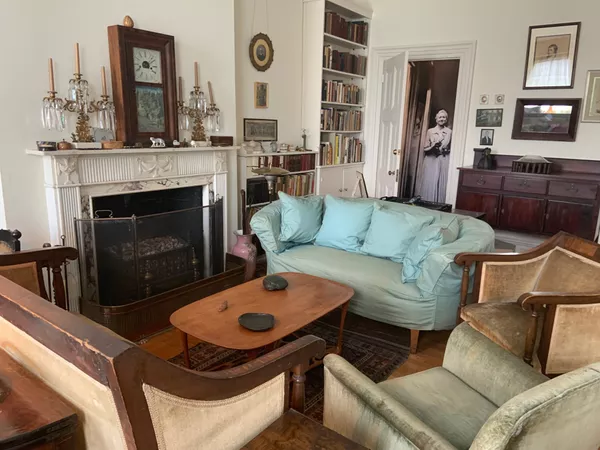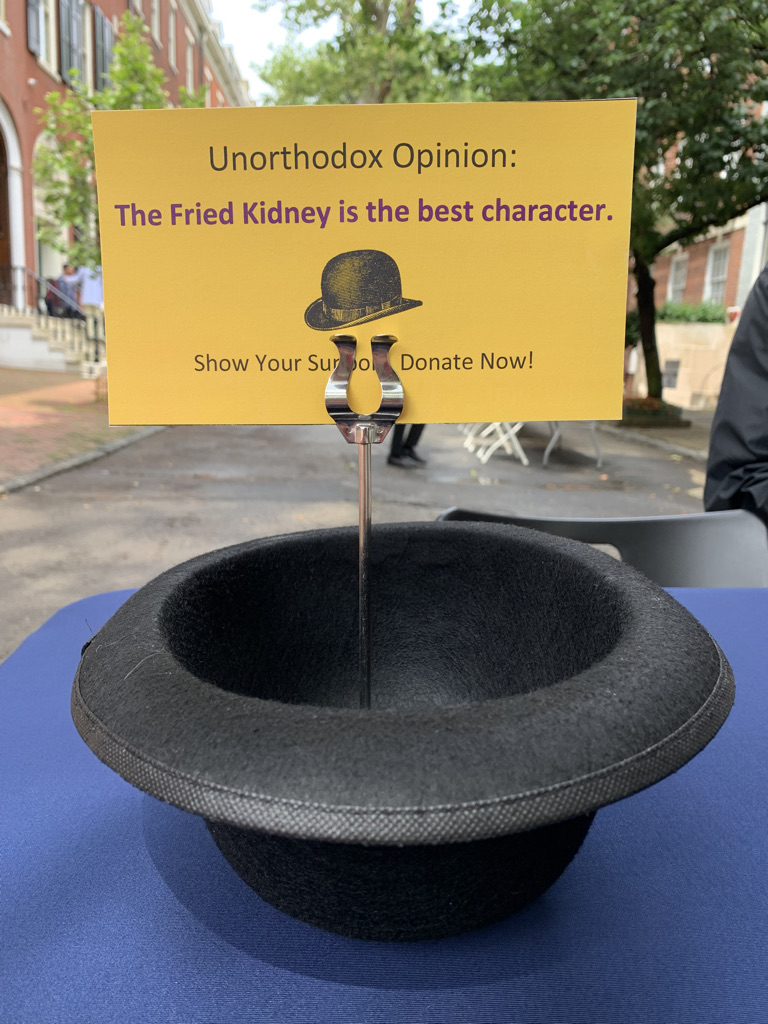 loomsday has come and gone, although James Joyce’s novel Ulysses will still be 100 years old throughout 2022!
loomsday has come and gone, although James Joyce’s novel Ulysses will still be 100 years old throughout 2022!
Here’s a report on my trip to Philadelphia to celebrate Bloomsday on 16 June at the Rosenbach Museum, the day in 1904 that the novel Ulysses takes place.
THE ROSENBACH MUSEUM
The Rosenbach Museum used to be the home of, well, Dr. Rosenbach and his brother Philip.

“Abraham Simon Wolf Rosenbach was born on July 22, 1876, in Philadelphia, Pennsylvania,” and thus begins the Wikipedia entry. It continues, “He bought and sold numerous items throughout his life, including eight Gutenberg Bibles, more than 30 Shakespeare’s First Folios, a copy of the Bay Psalm Book and the manuscripts of Ulysses and Alice’s Adventures in Wonderland. The lifetime total of his purchases is estimated to be worth more than $75,000,000 in 2019.”
Uncle Wiki also tells us that, “Items in the brothers’ collection include the only surviving copy of Benjamin Franklin‘s first Poor Richard’s Almanack and the manuscript of James Joyce‘s Ulysses.” And because of this manuscript, Bloomsday is celebrated in style at the Rosenbach Museum in Philadelphia.
I will leave these links live so you can be very impressed with Dr. Rosenbach’s holdings. And for the European readers, you might enjoy Philadelphia. Dr. Rosenbach earned his PhD at the University of Pennsylvania, writing a dissertation called, “The influence of Spanish literature in the Elizabethan and Stuart drama,” and yet he renounced academia for the “anxiety and excitement of the chase,” referring to the sleuthing and bargaining involved in purchasing rare books.

His friends called him Rosy or Abe, but I am too intimidated by the man to do that. Others were intimated by him as we gather by other nicknames. He was variously named “The Terror of the Auction Room,” and in France, “Le Napoléon des Livres” (The Napoleon of Books). The French have a great respect for Napoleon and his codification of laws, so that moniker is probably a compliment. However, others called him Dr. R., defining the R to stand for Robber Barron, which we know refers to the ruthless pursuit of wealth in the 19th Century, by squashing all competition, among other practices. Whether he really was a Robber Baron in that sense or not, Dr. Rosenbach was also generally referred to as “the Greatest Bookdealer in the World.”
THE LAY OF THE LAND
Now you have the lay of the land, of Dr. Rosenbach and the Rosenbach Museum on Delancey Street in Philadelphia. But as our French neighbor and head of the Sufi Order of the West, Pir Vilayat Inayat Khan, used to say, “the map is not the territory.” You must have the experience of going upstairs in the townhouse to a small parlor, and there beholding the first published book in so called British America, or the thirteen colonies as we call it today, the Bay Psalm Book, put forth in Massachusetts, in 1640. There it is, about six inches wide, a red binding, and you are looking at history. Interesting that the first book published here was a book of psalms and not the Bible.
Here is a Rosenbach story: Someone from Scotland called to say that he had a copy of the Bay Psalm Book. He was sending his daughter over with it to help defray her college costs. Now, Mr. Rosenbach was dubious. There were ten extant copies and the likelihood of this being number eleven was slim. Well, it turned out to be number eleven. Mr. Rosenbach asked the Scottish gentleman what he would like for this volume. And the man, in the 1930’s, said what would amount to over one thousand dollars in today’s money. One of the other ten copies recently sold at auction for just under $15,000,000. A clever way to keep your cards close to your chest, n’est-ce pas? (right?)
ON TO ULYSSES

by the Rosenbach
The history of the manuscript of Joyce’s Ulysses is a bit mind-boggling because there are so many. But here is where our Mr. Rosenbach comes in. A certain collector, Mr. Quinn, who lived in New York City, was ill. He decided to sell his manuscripts. Naturally, our Mr. Rosenbach went up to New York to bid. He paid a hefty penny for a collection of Conrad manuscripts, which you can see today at the Rosenbach. It turned out that Mr. Quinn had an arrangement with Joyce. Joyce would send a fair copy of the manuscript, written by hand, and Quinn would send him money. Effectively, then, Quinn owned the manuscript which he was happy to sell to Rosenbach, who had already had a copy of the banned book smuggled into Philadelphia in 1922, The bidding was not very heated and Rosenbach got the manuscript for under $2000. Joyce was livid! He demanded that Rosenbach sell him the manuscript for that price. Dr. Rosenbach refused. And Joyce was mad ever after.
This manuscript differs widely from the final text due to many typescripts that were often revised further. But still. The first full manuscript of Ulysses in fair copy (by hand) is in Ireland. No! Philadelphia.
ROSENBACH MADE FAMOUS
Apparently either Rosenbach or a secretary misspelled the name of the Joyce’s book. And Joyce wrote a limerick at Rosenbach’s expense.
“Rosy Brook he bought a book,
Though he didn’t know how to spell it. Such is the lure of literature,
To the lad who can buy and sell it.”
— James Joyce
LET’S GO TO BLOOMSDAY

When you arrive at the Rosenbach Museum, a townhouse there on Delancey Street, many people are wearing those flat brimmed hats and seer-sucker suits.
You take a seat, and the novel reading begins. Excerpts are taken from each of the 18 episodes, and people, ordinary folks, or the Irish ambassador, or actors, all march up to the podium and deliver a reading such as you have never heard before. In one episode, Leopold Bloom, the modern day Irish Ulysses, talks to his cat. And the performer obliges with many lusty “meows” where the script says “meow!”

Here are four minutes (out of many more) for those of us who love cats.
There is love the world over for this day, the day that Joyce and his future wife Nora first went out together. It’s the day that the whole novel takes place, a day that was a way of memorializing the importance of the day, and his wife, to Joyce personally. It’s a day filled with insights into the inner workings of particularly Bloom’s mind, but also Molly’s at the end. (Molly is a version of Nora, so they say.) We also have the skeletal underpinnings of Homer’s Odyssey and lots of goings on about the Catholic Church as well as many different literary styles. Reading the book has become a cottage industry! And this blog, writing4godot, also came into being on this very day in 2020.

BECKETT?
I was amused to see in Ulysses similar absurdist exchanges between people, or the absurd, supposedly logical conclusions, that we see in Waiting for Godot. As Beckett himself says, he went in for impoverishment compared with Joyce’s effulgence. You do not see either of the vagabonds, Vladimir or Estragon, with a book, although they do refer to the Bible, particularly that one of the thieves hanging next to Jesus was saved, but the other was not. Vladimir wonders why only one of the Evangelists talks about that man. Saved, not from damnation, but from death. Do we have a hint of Biblical exegesis? A critical interpretation of the Bible? So Beckett and Joyce both travelled down the same modernist road. In the country. With a tree. And a moon.
[anyone want to read Ulysses together?]